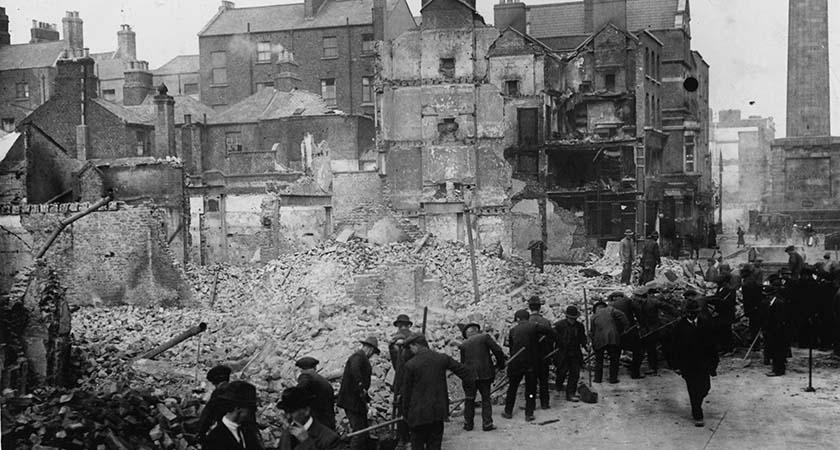Entitled The Seven, Edwards book aims to tackle the myths, lies and truths of the Easter Rising in what is "the first composite biography of the founding fathers of the Irish Republic".
Here Edwards picks seven fascinating facts from her research
1. The leaders were only a tightknit group towards the end of their lives
The tobacconist Tom Clarke, the political organiser Seán Mac Diarmada, the head-teacher Patrick Pearse, the accountancy clerk Éamonn Ceannt, the academic Thomas Mac Donagh, the dying polymath Joe Plunkett and the trade union leader James Connolly were a close group only towards the very end and for a very short time.
2. Not all of them were friends
Clarke and Mac Diarmada were intimate friends, as were MacDonagh and Plunkett. MacDonagh was Patrick Pearse’s best friend, but Pearse had no intimates except his brother Willie. None of them was close to the reserved Eamonn Ceannt or to James Connolly, who had his own separate world.
 3rd May 1916: Volunteers clearing debris in Dublin after the Easter Rising. (Photo by Topical Press Agency/Getty Images)
3rd May 1916: Volunteers clearing debris in Dublin after the Easter Rising. (Photo by Topical Press Agency/Getty Images)3. They all had identity problems
What they unwittingly had in common were early problems of identity, loss or displacement. Tom Clarke was born out of wedlock to a Catholic mother, his father was a Protestant soldier in the British army, as a child he took sides in the turbulent politics of South Africa, at eight was moved to a hotbed of Ulster sectarianism, at twenty-one fled to the embrace of Irish-American Fenianism and at twenty-six he was sent on an abortive bombing mission to London which led to fifteen years in English prisons in a regime of silence and isolation.
4. Mac Diarmada was converted to radical republicanism in Belfast
Seán Mac Diarmada’s mother was ill for years during his Leitrim childhood and died when he was only nine: he spent several teenage years failing to pass the exams to qualify as a teacher (“I hate Euclid and I’m afraid that the old rascal will have revenge on me if he catches me at the examination” he rightly predicted) and had menial jobs in Edinburgh and Belfast where he was converted by a Quaker republican from being a faithful and pious member of the Catholic Ancient Order of Hibernians to radical republicanism and was sworn into the Irish Republican Brotherhood.
5. Ceannt went from a "rural paradise" in County Louth to chaos at the GPO
Éamonn Ceannt was uprooted to Dublin at eleven from a rural paradise in Ardee, County Louth, where he fished and rambled and mimicked bird calls; his mother died suddenly when he was thirteen. His father had been a sergeant in the Royal Irish Constabulary, which one of his elder brothers joined, another joined the Royal Dublin Fusiliers and a third became a civil servant, but young Ned Kent emerged from his Christian Brothers School so intensely nationalist he would not consider being employed by the state and became a fanatical Gaeilgeoir.
6. MacDonagh was due to become a priest
Thomas MacDonagh’s mother was half-English and an enthusiastic Catholic convert from Unitarianism who transmitted to her children her ‘grave high sense of moral purpose.’ As a boarder in Rockwell College, Tipperary, he decided to become a priest but he abandoned the seminary after a profound crisis of faith in his early twenties and embarked on a series of intellectual, metaphysical, cultural and finally military journeys.
7. Plunkett went to five schools in three different countries despite being bed-bound for prolonged periods
Joseph Plunkett had appalling health, a crazy mother and a consistently disrupted childhood, which included two schools in Dublin, two in England, one in France and long periods with none at all. He had contracted bovine tuberculosis when he was two, and throughout his short life was frequently consigned to bed for long periods and expected to die. Curious about everything, his favourite writer was G.K. Chesterton, whom he loved for his humanity, his intellectual profundity, his whimsicality, his ability to see the fun in even the most serious subjects and his paradoxically down-to-earth appreciation of mysticism.
8. Connolly was born in Edinburgh and was once a British soldier
James Connolly was born and brought up in Edinburgh and joined the British Army at fourteen, but when he moved to Ireland in 1896 he felt obliged for the sake of making his socialism more acceptable, to conceal his origins, his army service and his atheism. He had been dead for fifty years before a biography revealed that -contrary to received wisdom - he had not been born in Monaghan. He travelled so much in Ireland, Britain and America that between 1900 and 1916 he was away from his family for a total of four years.
9. Pearse's father was English
And then there was Patrick Pearse, whose father was an Englishman, a Methodist turned Freethinker and a rationalist who for business reasons had pretended to convert to Catholicism, while his mother was an emotional, Catholic Irish nationalist who so over-mothered her four children that three of them never left home and none of them had a normal sexual relationship. Pearse sought to serve Ireland selflessly, but was so deeply conflicted and unhappy that he became fixated on dying for it.
10. Although they shared a common purpose, the leaders had different aspirations for Ireland's future
They had very different ideas about the Ireland they wanted post-revolution, which included a monarchy under a Catholic German Prince, a rural Celtic utopia and a Marxist state. There is no evidence that they ever discussed them as a group.
The Seven is published by Oneworld and is priced at £14.99 on hardback or £9.99 as an ebook.


